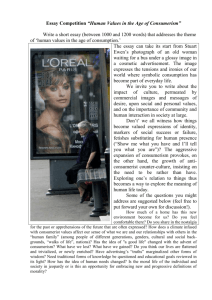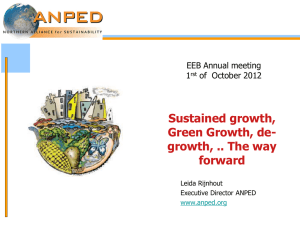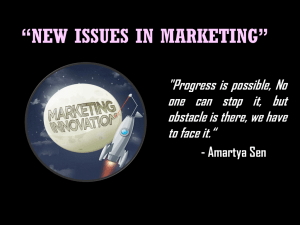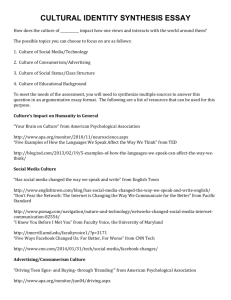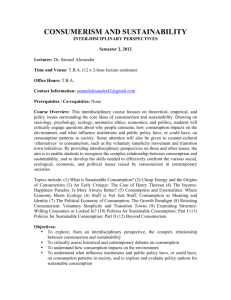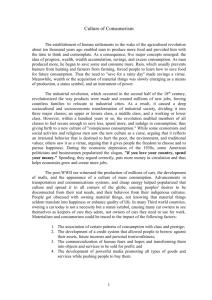CONSUMERISM
advertisement
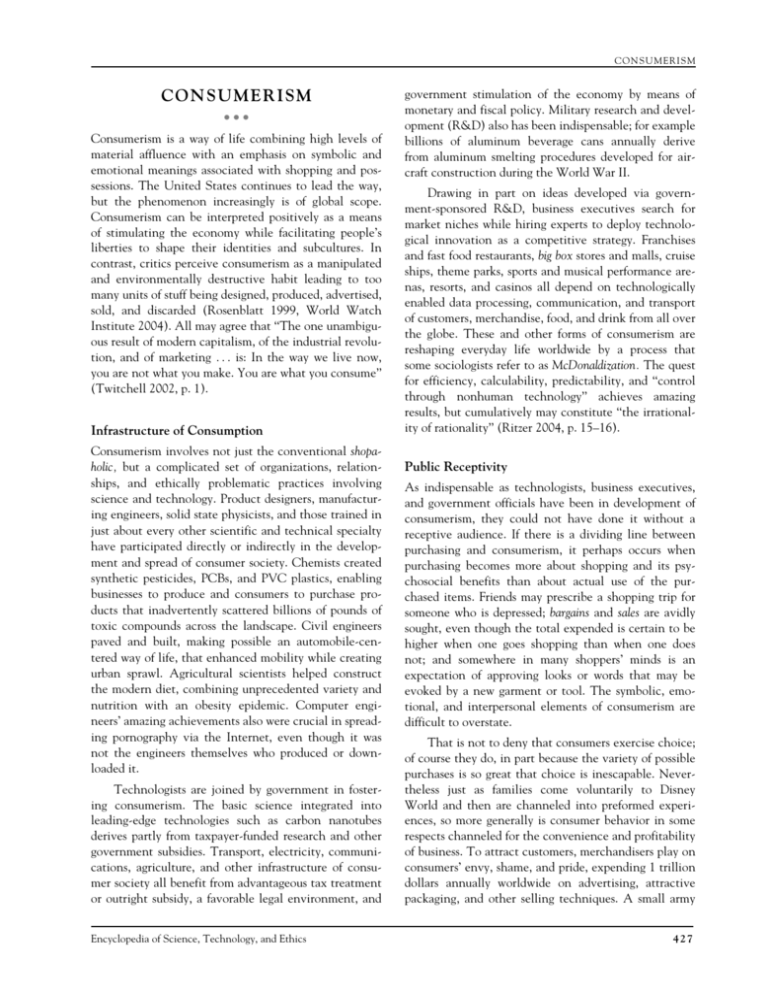
CONSUMERISM CO NSU MERI SM Consumerism is a way of life combining high levels of material affluence with an emphasis on symbolic and emotional meanings associated with shopping and possessions. The United States continues to lead the way, but the phenomenon increasingly is of global scope. Consumerism can be interpreted positively as a means of stimulating the economy while facilitating peopleÕs liberties to shape their identities and subcultures. In contrast, critics perceive consumerism as a manipulated and environmentally destructive habit leading to too many units of stuff being designed, produced, advertised, sold, and discarded (Rosenblatt 1999, World Watch Institute 2004). All may agree that ‘‘The one unambiguous result of modern capitalism, of the industrial revolution, and of marketing . . . is: In the way we live now, you are not what you make. You are what you consume’’ (Twitchell 2002, p. 1). Infrastructure of Consumption Consumerism involves not just the conventional shopaholic, but a complicated set of organizations, relationships, and ethically problematic practices involving science and technology. Product designers, manufacturing engineers, solid state physicists, and those trained in just about every other scientific and technical specialty have participated directly or indirectly in the development and spread of consumer society. Chemists created synthetic pesticides, PCBs, and PVC plastics, enabling businesses to produce and consumers to purchase products that inadvertently scattered billions of pounds of toxic compounds across the landscape. Civil engineers paved and built, making possible an automobile-centered way of life, that enhanced mobility while creating urban sprawl. Agricultural scientists helped construct the modern diet, combining unprecedented variety and nutrition with an obesity epidemic. Computer engineersÕ amazing achievements also were crucial in spreading pornography via the Internet, even though it was not the engineers themselves who produced or downloaded it. Technologists are joined by government in fostering consumerism. The basic science integrated into leading-edge technologies such as carbon nanotubes derives partly from taxpayer-funded research and other government subsidies. Transport, electricity, communications, agriculture, and other infrastructure of consumer society all benefit from advantageous tax treatment or outright subsidy, a favorable legal environment, and Encyclopedia of Science, Technology, and Ethics government stimulation of the economy by means of monetary and fiscal policy. Military research and development (R&D) also has been indispensable; for example billions of aluminum beverage cans annually derive from aluminum smelting procedures developed for aircraft construction during the World War II. Drawing in part on ideas developed via government-sponsored R&D, business executives search for market niches while hiring experts to deploy technological innovation as a competitive strategy. Franchises and fast food restaurants, big box stores and malls, cruise ships, theme parks, sports and musical performance arenas, resorts, and casinos all depend on technologically enabled data processing, communication, and transport of customers, merchandise, food, and drink from all over the globe. These and other forms of consumerism are reshaping everyday life worldwide by a process that some sociologists refer to as McDonaldization. The quest for efficiency, calculability, predictability, and ‘‘control through nonhuman technology’’ achieves amazing results, but cumulatively may constitute ‘‘the irrationality of rationality’’ (Ritzer 2004, p. 15–16). Public Receptivity As indispensable as technologists, business executives, and government officials have been in development of consumerism, they could not have done it without a receptive audience. If there is a dividing line between purchasing and consumerism, it perhaps occurs when purchasing becomes more about shopping and its psychosocial benefits than about actual use of the purchased items. Friends may prescribe a shopping trip for someone who is depressed; bargains and sales are avidly sought, even though the total expended is certain to be higher when one goes shopping than when one does not; and somewhere in many shoppersÕ minds is an expectation of approving looks or words that may be evoked by a new garment or tool. The symbolic, emotional, and interpersonal elements of consumerism are difficult to overstate. That is not to deny that consumers exercise choice; of course they do, in part because the variety of possible purchases is so great that choice is inescapable. Nevertheless just as families come voluntarily to Disney World and then are channeled into preformed experiences, so more generally is consumer behavior in some respects channeled for the convenience and profitability of business. To attract customers, merchandisers play on consumersÕ envy, shame, and pride, expending 1 trillion dollars annually worldwide on advertising, attractive packaging, and other selling techniques. A small army 427 CONSUMERISM of psychologists and statisticians conduct market research to learn how to stimulate sales, ‘‘constantly gaining more precision in pinpointing the demographic and lifestyle trends of consumer segments, employing new tools such as Internet cookies to monitor the clickstreams of e-shoppers’’ (Cohen 2003, p. 402). The finance industry brilliantly stimulates the borrowing necessary to keep spending high. Criticisms and Rejoinders The disposable income required to purchase a growing array of goods and services is of course far more available to the affluent, who are located mainly in North America, Japan, and Europe. At the other end of the spectrum are approximately 1 billion persons who live in absolute poverty, about as many humans as the total number alive prior to the Industrial Revolution. To families without toilets or clean drinking water, television broadcasts the lifestyles of the rich and thereby stimulates consumer aspirations and helps spread consumer society across the globe. Within affluent cultures, intangible ethical consequences of consumerism appear to include deterioration of face-to-face community, increased rates of psychological depression without commensurate improvements in happiness (Lane 2000), and reduced interaction among family members as children turn increasingly to the televisions and computers in their bedrooms. ParentsÕ long working hours sometimes come at the expense of sleep, leisure, family, and friends—a syndrome far more common in some countries (such as the United States) than in others (Schor 1998). Consumerism is environmentally problematic in obvious ways, but also more subtly, as when distant consumersÕ appetites for shrimp, teak, and coffee disrupt fragile tropical ecosystems (Tucker 2002). Whether consumerism potentially can be made compatible with environmental sustainability is debatable. The formula for calculating ecological damage is roughly the total number of humans, multiplied by the amount consumed per person, multiplied by the resources utilized and toxicity released per unit of consumption. If the human population declines soon enough, and if technologists figure out how to dramatically reduce resource usage and pollution per unit produced and consumed, increasing material affluence per person might be compatible with greatly reduced environmental damage. Advocates of natural capitalism propose radically reconceptualized ways of providing housing, transport, and consumer products (Hawken et al. 1998, McDonough and Braungart 2002); and a few nanotechnologists believe that mole428 cular manufacturing eventually may eliminate hazardous wastes and other side effects of production. As of the early twenty-first century, however, reductions in pollution per unit in most industries have been offset by population growth and by increased consumption per person. Not everyone agrees with the above diagnosis. Among counterarguments, they point out that contemporary economies are organized to require an unpleasant choice: allow recession and unemployment, or stimulate the economy through ever-higher levels of consumer spending. In poorer nations, increased investment and purchasing theoretically might be devoted to basic needs including water supply systems, safe sanitation, housing, and nutrition. In the already affluent nations, however, economic growth tends to mean more elaborate barbeque grills, second homes, cosmetic surgery, and other luxuries. These are lesser evils, or not evils at all, to those who emphasize the benefits of full employment, interesting jobs, and liberty to purchase a lifestyle more of oneÕs own choosing than previously possible for most of humanity, together with the value of technological innovation as a means of making life more diverse and more interesting (McCracken 1988). The Challenge of Change Few knowledgeable observers presently consider consumer trends compatible with environmental sustainability, but those concerned about unlimited consumerism face a difficult task in addressing the issue. It is easy to make products and production processes a bit greener by, for instance, creating biodegradable carpeting. But limiting the total volume of production and consumption is far more difficult, requiring people to forego some of what they have learned to want. Such a change in consumer mentality presumably would require slowing the drumbeat of messages encouraging consumption, and perhaps even a ban on advertising as well as tight restrictions on consumer credit. Such changes surely depend on ardent environmentalists and other slowgrowth advocates winning more elections, which cannot happen without a different attitude among citizens. In other words, consumerism is constructed as a circle, a vicious circle in the eyes of critics. Changed thinking among scientists, engineers, and other technically trained persons also might be necessary to intervene in the consumerist trajectory. In effect, technoscientists now gain governmental research funding by helping create weaponry, communications, transport, and other innovations helpful in military affairs and in economic activities valued by governing elites. A Encyclopedia of Science, Technology, and Ethics CONTRACTS similar expectation leads industry to help fund scientific research, employ technoscientific consultants, and hire college graduates in chemistry, biotechnology, computer science, and other technical fields. All this makes good sense, in a way; but the partially unintended, collective consequences include the problematic aspects of consumerism. Breaking out of the consumerist cycle would involve billions of persons over generations in evolving a commendable, interesting, high-technology, lowerconsumption way of life. This, arguably, is the master challenge for human civilization—an activity so farreaching and visionary that no one can fully imagine what would be involved. However a first step probably would require that more people begin to think of consumerism as an ethical, technological, economic, and political issue to be addressed. EDWARD J. WOODHOUSE Advertising, Marketing, and Public Relations; Affluence; Cosmetics; Material Culture; Materialism; Popular Culture; Population; Waste. S EE A LS O Forge Press. Sociological interpretation of the mechanisms that major organizations use to serve growing numbers of people in standardized ways, while displacing local businesses and helping change the culture of everyday life. Rosenblatt, Roger, ed. (1999). Consuming Desires: Consumption, Culture, and the Pursuit of Happiness. Washington, DC: Island Press. A collection of essays by critics of consumer society. Schor, Juliet B. (1998). The Overspent American: Upscaling, Downshifting, and the New Consumer. New York: Basic Books. A nonconventional economistÕs interpretation of the quest for status via consumption. Tucker, Richard. (2002). ‘‘Environmentally Damaging Consumption: The Impact of American Markets on Tropical Ecosystems in the Twentieth Century.’’ In Confronting Consumption, ed. Thomas Princen, Michael Maniates, and Ken Conca. Cambridge, MA: MIT Press. Twitchell, James B. (2002). Living It Up: Our Love Affair with Luxury. New York: Columbia University Press. An evenhanded attempt to find out what luxury means to consumers, based in part on ethnographic research in Beverly Hills and other shopping havens. World Watch Institute. (2004). State of the World 2004: The Consumer Society. New York: W. W. Norton. Describes global environmental effects of consumption, and presents a plan for moving toward what the authors consider a more just and more sustainable civilization. BIBLIOGRAPHY Cohen, Lizabeth. (2003). A ConsumerÕs Republic: The Politics of Mass Consumption in Postwar America. New York: Basic Books. A historical study of the shift in the U.S. toward consumer-citizens who focus not on politics as a quest for the common good but on having government facilitate personal consumption. Hawken, Paul, Amory Lovins; and L. Hunter Lovins. (1998). Natural Capitalism: Creating the Next Industrial Revolution. Boston: Little, Brown. Proposes changes in housing, transport, and many other aspects of production and consumption to make compatible the goals of business profitability, technological innovation, fairness, diversity, and environmental sustainability. Lane, Robert E. (2000). The Loss of Happiness in Market Democracies. New Haven, CT: Yale University Press. Summarizes and interprets psychological research calling into question the hope that consumerism can lead to a permanent state of enhanced life satisfaction. McCracken, Grant D. (1988). Culture and Consumption: New Approaches to the Symbolic Character of Consumer Goods and Activities. Bloomington: Indiana University Press. Materialism as a quest for intangible goods such as identity and belonging. McDonough, William, and Michael Braungart. (2002). Cradle to Cradle: Remaking the Way We Make Things. New York: North Point Press. A visionary yet down-to-earth analysis of how a highly technological lifestyle could be elegantly designed to be environmentally benign. Ritzer, George. (2004). The McDonaldization of Society, revised new century edition. Thousand Oaks, CA: Pine Encyclopedia of Science, Technology, and Ethics CONTRACEPTION SEE Birth Control. CONTRACTS Contracts are legally enforceable agreements between persons that specify transactions or define relations between them. Either informal or written, they may concern any lawful human transaction, from purchases and loans to hiring and marriage. In engineering and science, contracts play important roles because, in both domains, practitioners do a great deal of work under some form of contract. Defining what the parties are obligated or permitted to do, contracts establish an ethical framework for engineering and scientific work, and they present ethical problems. The ethical framework has at its core one or more promises. Because the promises are legally enforceable, they involve a third actor in addition to the promisor and the promisee, government. 429
